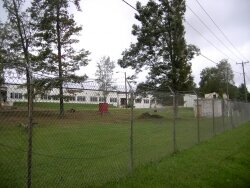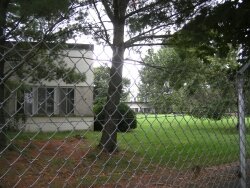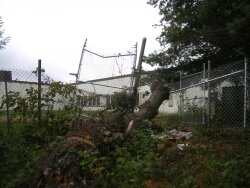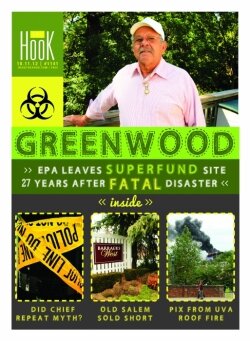Less hazardous: Acme Visible Records gets cleaned
-
 The former Acme Visible Records plant on Three Notch'd Road in Crozet will be prime real estate-- once the carcinogens are cleaned up.photo by lisa provence
The former Acme Visible Records plant on Three Notch'd Road in Crozet will be prime real estate-- once the carcinogens are cleaned up.photo by lisa provence -
 Trees outside the 1950s plant's offices have matured in the 20 years since anyone worked there. (ONLINE BONUS PHOTO)photo by lisa provence
Trees outside the 1950s plant's offices have matured in the 20 years since anyone worked there. (ONLINE BONUS PHOTO)photo by lisa provence -
 Damage from the derecho probably is the least of the worries for this property. (ONLINE BONUS PHOTO)photo by lisa provence
Damage from the derecho probably is the least of the worries for this property. (ONLINE BONUS PHOTO)photo by lisa provence -
 hook graphic
hook graphic
For more than 10 years, a prime commercial/light industrial site in designated-growth-area Crozet has been empty. It turns out there's a reason for that: it's polluted.
Acme Visible Records, which specializes in making file cabinets and office accoutrements that are hallmarks of the pre-computer era, was once, along with next-door neighbor Morton Frozen Foods, one of the largest employers in Crozet.
In a 1978 full-page ad in the Daily Progress, Acme boasted of having more than 600 employees in Crozet– and of its environmental and pollution controls. The ad also mentioned that the plant had its own water supply and waste treatment plant "without cost to taxpayers."
By 1992, Acme was struggling under bankruptcy and moved part of its manufacturing elsewhere, while some manufacturing operations continued at the Crozet plant until 2001 under a new owner.
When the plant, located at 5327 Three Notched Road, was in operation, it routed industrial wastewater to a 1.6-acre lagoon on the southern end of the property. The EPA lists nine contaminants, including arsenic, benzene, and lead, that seeped into the soil and groundwater. The most troublesome is a solvent called trichloroethene, a.k.a. TCE.
"It's a carcinogen," says Ryan Kelly, corrective action project manager with the Virginia Department of Environmental Quality. He notes that TCE– the featured toxin in the 1998 John Travolta drama, A Civil Action– is bad news in drinking water.
An old realtor's sign remains out front, but until the chemicals that seeped into the soil and groundwater are cleaned up, the 62-acre property won't be on the market.
"The remediation system is in place," says Kelly. "It's going to take time."
Site remediation began in early 2011 with three methods: soil vapor extraction, a groundwater bio-remediation system, and chemical oxidation, explains Kelly.
"We're trying to use natural organisms to remediate," he says.
The property owner was the Chicago-based Wilson Jones Company. That's the firm that's said to have invented the 3-ring binder and which acquired some Acme assets. However, a corporate switch left Acme in the hands of Beam Inc., the publicly held company that distills a well-known bourbon and other liquors. Beam has cooperated with authorities and paid for the cleanup, says Kelly.
In June, the second phase of the cleanup began as the manufacturing plant and office areas came under scrutiny for contamination.
"This step is an investigation into areas unlikely to have environmental impacts," says property spokesperson Sarah Huddle. "We haven't found any additional problems."
More good news for the contaminated site is that remediation is likely to wrap between 2014 and 2016, so the property can be returned to productive use– something that the community, Huddle notes, is keenly seeking.
"I think it's a shame that building hasn't been put to use," says a former Acme Visible Records employee, who spoke only on condition of anonymity.
Does she have any health concerns about working at a contaminated site?
"Absolutely not, and I worked there for 32 years," she replies.
